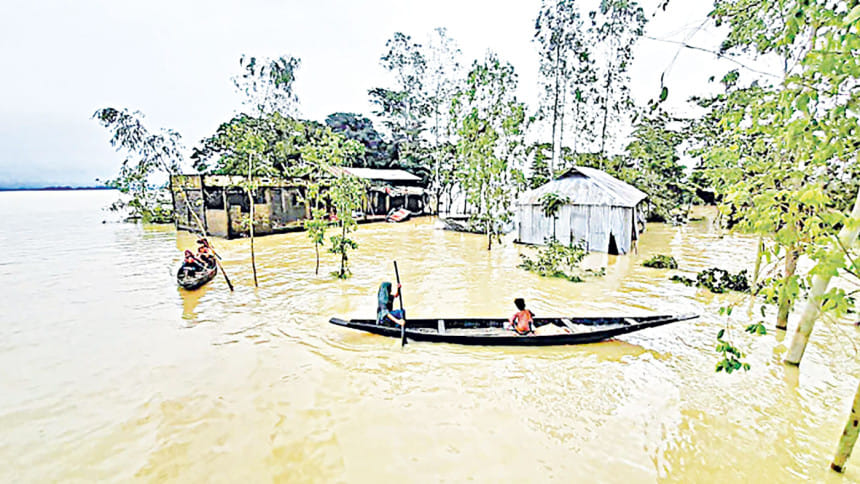On the Constitutional rights of flood victims

Heavy rains along with the continued onslaught of water from upstream locations in India marooned Sylhet and the neighboring districts jeopardising the residents' fundamental rights. It is incumbent upon the government to respect, protect and fulfill the obligations enumerated in the Constitution, sustenance of which have not been possible on these rainy days.
Fundamental rights, as specified in the Constitution, are non-derogable obligations that the government must uphold, and therefore, safeguarding them is the government's constitutional responsibility. Occasioning of a catastrophe does not extinguish the rights of the people. It is time to adopt a right based approach to disaster management with the likelihood of disasters growing more intense due to climate change.
Article 31 declares the right to protection from action detrimental to the life, liberty, body, reputation or property. The right to life is a fundamental right enshrined in Article 32 of the Constitution of the People's Republic of Bangladesh. At the 57th Session of the Commission on Human Rights in 2001, Klaus Toepfer, Executive Director of the UNEP, expressed that environmental degradation make it impossible to protect human rights and environmental conditions clearly help to determine people's basic rights to life, health, food and housing etc. Environmental protection is thus within the purview of the right to life, as per a harmonious interpretation of the two clauses. It is the responsibility of the state to safeguard the environment in order to ensure the right to life.
The goal of protecting this right is to bring order to the chaos caused. International cooperation and collaboration should be the breakthrough in effectuating cross-border issues like flood.
The recent flood in the Sylhet division worsened the living conditions of the local inhabitants in almost every aspect. According to the data given by Divisional Commissioner of Sylhet, Dr. Muhammad Mosharraf Hossain to The Business Standard published on June 19, 2022, 90% of the Sylhet division was submerged in water. Multiple incidents of robbery have been reported. Skyrocketing prices devastated the buying capabilities of the affected people. The Agriculture Minister reported the destruction of 22,000 hectares of cropland in the flood. More than 1.5 lakh power subscribers in Sylhet and Sunamganj were completely cut off and left without access to the internet. The flood victims faced severe dearth of food and shelter. This cataclysm has made it more difficult for people to exercise their rights to freedom of movement, property, and the protection of their homes and correspondence, which is a clear infringement of the constitutional protections.
The Apex Court of Bangladesh has already expanded its hitherto established limit of right to life and included environmental protection in it, in the case of Dr. Mahiuddin Farooque v Bangladesh, in which Justice Bimalendu Bikash Roy Chowdhury opined to include the protection and preservation of the environment under the protective umbrella of right to life.
The goal of protecting this right is to bring order to the chaos caused. International cooperation and collaboration should be the breakthrough in effectuating cross-border issues like flood. Moreover, inter-departmental coherence and communication should be strongly bridged. Adequate assessment and monitoring of disaster hazards and vulnerabilities should be introduced. Again, communication problems deterring outside assistance from getting to remote locations can be resolved by empowering local government under Articles 59 and 60 of the Constitution through allocating sufficient budget for prompt rescue and relief. UNEP's Adaptation Gap Report 2021 suggests increasing climate adaptation finance to deal with environmental catastrophe. As the last remedy, Professor Mathew Hall prescribes to hold the government accountable for the failure to prevent or reduce the disaster risk and damage caused.
Now, the flood victims are underprivileged communities regarding whom positive discrimination would be allowed. So the most significant contribution has to be made by the government with the help of NGOs and other organisations along with local community to remedy the miseries caused to the people. Otherwise, overcoming this and such crisis would be a long dream to cherish.

 For all latest news, follow The Daily Star's Google News channel.
For all latest news, follow The Daily Star's Google News channel. 



Comments